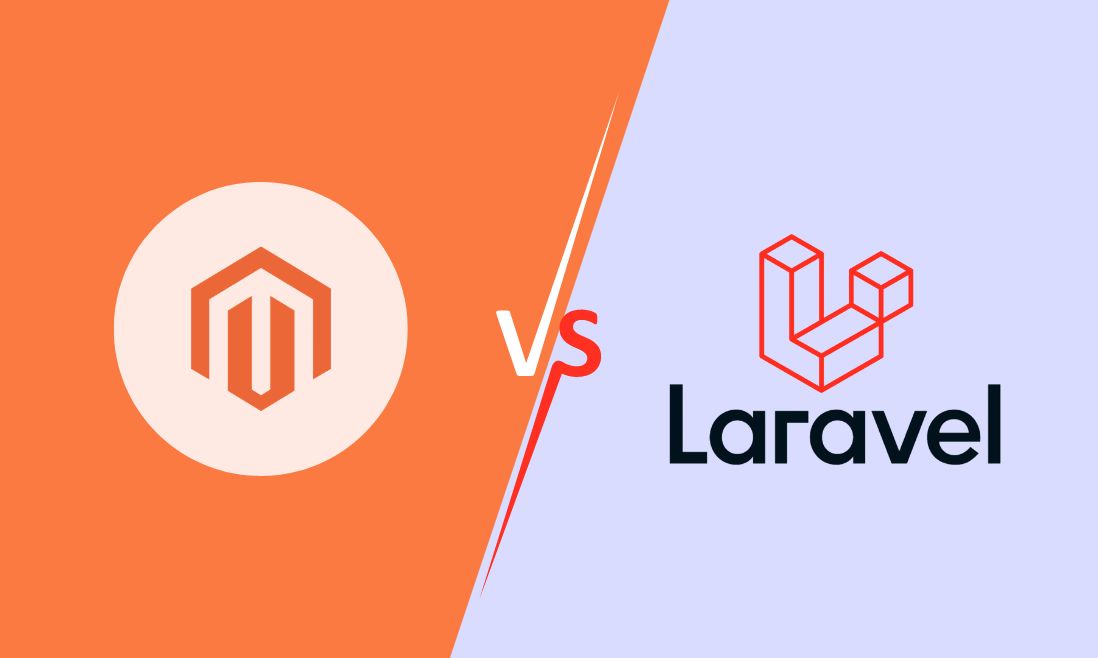In the ever-evolving world of e-commerce and web development, choosing the right platform or framework can be challenging. Magento and Laravel are two solid options for entrepreneurs to consider.
In this blog post, we will explore the strengths and weaknesses of Magento vs Laravel, dissecting their key attributes to help you make an informed choice that aligns with your unique web development and e-commerce needs.
Contents
Overview Of Magento

Magento is one of the most popular e-commerce platforms, so you can come across it in any article about this topic. An open-source E-commerce content management system (CMS), Magento is written in PHP and built mainly on the Zend framework. Other frameworks that Magento used recently are Laminas and Symfony frameworks.
Magento was first developed in early 2007 by Varien Inc. Its official launch came in 2008. A decade later, Adobe acquired it in 2018 and renamed it Adobe Commerce. Magento is rich in features with multiple tools and features equipped. Moreover, it is widely known for high flexibility and unlimited store customization.
| PROS | CONS |
| – High flexibility and scalability – Unlimited customizations – Fully stocked library of all essential tools, features, and extensions – Top-notch security – SEO-friendly – PWA (mobile-friendly) – Large community support | – Complicated and time-consuming development phase – Massive cost (especially the Commerce and Commerce Cloud Editions) – A lot of technical knowledge required |
Magento is a reliable platform for multiple corporations, for example, Ford Motor, Coca-Cola, Liverpool FC, Nike, and Bvlgary. Here’s a list of Magento examples that we’ve compiled, check it out if you’re interested.
Overview Of Laravel

Laravel is the best and most popular open-source PHP framework. It operates on the MVC architectural pattern, short for Model-View-Controller. Like Magento, Laravel is also based on Symfony.
Laravel is deemed pretty easy to use and master. It is equipped with simple features, some of which are very useful for developers. For instance, dependency injection, unit testing, queues, and real-time events are some of the things that will make the task of coding less burdensome.
Laravel has been around since June 2011. Initially, it was devised by Taylor Otwell as an E-commerce solution to replace CodeIgniter; hence, it comes with various creative features and new functions for developers. Besides, Laravel also attracts users with such tools as a strong Eloquent ORM, straightforward authentication, and effective pagination, to name but a few.
Examples of websites built with Laravel include BBC, Alison.com, Barchart.com, etc.
| PROS | CONS |
| – Availability of ready-to-use resources – Incorporation of PHP’s newest features – High processing speed – User-friendly interface – Minimal coding experience required – Decent security | – Poor mobile performance – No available payment method – Incompatibility between updated versions – Narrow user community |
Magento Vs Laravel: Key Comparisons
1. Code complexity

Everything about Magento has its logic and structure. Coding with Magento is a tough row to hoe as it requires great knowledge and significant experience. On average, it takes about 4 weeks to grasp the nuts and bolts of Magento. However, to fully understand and master it requires at least 6 months to a year.
Thanks to its PHP-based syntax with ORM-based coding, Laravel makes the work of developers better organized and easier to understand. Laravel coders can effortlessly understand and fix each other’s work (as long as they access the MVC framework).
2. Features and tools
Both Magento and Laravel have a well-stocked library of features, tools, and extensions to help create the best online stores.
Magento is an all-inclusive CMS. Let’s take a look at some of its prominent features:
- Analytics and Reporting: To help you manage your product sales better, Magento incorporates analytics and frequent reports on various aspects of your business, such as sales, tax, most viewed products, coupon usage, etc. These data can also be illustrated visually with customizable dashboards and export options.
- Product & Catalog Management: Magento includes multiple features to manage your inventory, such as zoom functions on images, stock availability, display quality, customer carts, wish-to-buy lists, etc. This is to ensure your stock meets the expectations of different types of customers.
- Payment: Earning money is your store’s ultimate goal, and Magento keeps things smooth. Single page checkout, copious payment gateways and channels, and various currencies accepted are just three solutions that Magento offers to your payment process.
- Logistics & Delivery: Magento has many third-party extensions that facilitate shipping and reduce the need for additional plugin installations. For example, you can link your store to ShopRunner, a subsidiary of FedEx Services. This allows for fast shipping and seamless checkouts.
- Search Engine Optimization: SEO is a great way to attract new customers and retain old ones. In other words, it serves to boost your website traffic and visibility in general. Magento is SEO-friendly in that it generates Google sitemaps and URLs, speeds up your website, and improves your internal linking structure.
- Mobile Commerce: PWA Studio is a feature that assists you in building, launching, and optimizing your Magento-powered progressive web apps. Besides, it also saves you a lot of time and money compared to the conventional approaches to building a PWA.
When it comes to features and extensions, Laravel is a worthy opponent of Magento. For Laravel, it’s not just about creating and displaying separate fragments. Instead, the Laravel company has invested in building “a whole ecosystem” (as they put it) of features and tools. They did it fantastically, indeed.
Let’s take a look at some of the features that Laravel refers to as “Everything you need to be amazing”:
- Database: As mentioned above, Laravel employs an ORM, namely Eloquent, that helps manage and organize your database effectively. You can update your data effortlessly, but you are expected to witness the perfectly smooth pairing of Eloquent with other data management software such as MySQL, Postgres, SQLite, and SQL Server.
- Queue system: Laravel helps you to create jobs, put them in a queue, and run them in the background. As more tasks are relocated to the back, it allows your website to run at lightning speed, respond more efficiently to customer requests, and greatly enhance customer experience.
- Broadcasting: Rather than repeatedly checking your application server for data changes, Laravel includes a WebSockets connection that allows you to broadcast changes in your server events to your client side. A direct result of this is a real-time and constantly updated user interface.
- Authentication: This is another widely recognized feature of Laravel. It takes your website security to the next level with its built-in system. Even APIs and mobile apps are granted protection, too. This saves your developers a lot of time that would otherwise be invested in writing monotonous authentication codes.
In addition, the Laravel ecosystem also provides a lot more functions to help scale your enterprise in the easiest way. For instance, Laravel Cashier plays a vital role in accepting payments, Laravel Dusk offers the solution of automated browser testing, Laravel Vapor allows for great scalability with serverless deployment, and you can leverage Laravel Forge to manage your server. The list goes on.
3. Content management

This category is a “home field” for Magento. A CMS in itself, Magento allows you to take complete control over your site. While the learning curve may be steep for professionals, Magento is still quite user-friendly, even for non-techies. After a web is completely built on Magento, you can easily configure everything in the backend.
Everything from what media content to display, what layout to pick to how frequent the content updates should be, is all up to you to decide. Magento even offers several tools to enhance the effort of content management and SEO for better web ranking.
The ability to manage your content with Laravel is much more limited. It does not bring as much freedom as Magento. Instead, Laravel requires high technical expertise and coding experience to build an optimized store.
4. Hosting
If you opt for the free version of Magento, also known as Magento Open Source, then you must find your web host. But this should not be a problem. With how popular Magento is, there are many hosting services suitable for it. Magento Commerce Edition (the premium version), on the other hand, offers several cloud hosting plans. You are also entitled to unlimited bandwidth and free domain names.
Both the free and paid versions of Laravel are self-hosted, so once again, you find yourself in a demanding quest for a web host. However, this may not be a tough nut to crack anymore. Laravel has recently introduced some alternatives, such as Laravel Hosting, Larametrics, and Laravel Forge (the last one links your website to their trusted cloud providers).
5. Cost
Cost is a factor that businesses must consider, especially those small and medium sized ones with limited financial capability. The ultimate goal is to find an E-commerce solution that suits your pocket, so it is advisable to spend time shopping around and weighing your options to avoid blowing your budget.
Let’s come back to the two options, Magento vs Laravel. It is pretty easy to hazard a guess that Laravel is much more budget-friendly. Both platforms offer a free and a paid version. This is great for startups and SMEs.
Laravel’s packages range from $499 – $1299, which are still quite affordable. Yet, the Magento Commerce Edition literally costs an arm and a leg for those who go for the premium version. It would charge from $22,000 a year.
While the price of Magento is exorbitant, it is a worthwhile trade-off if we take into account the more features and customization options available. At the end of the day, these factors enhance customer experience and possibly generate greater profits for your business. A direct proportion, indeed.
6. Security

When comparing Magento and Laravel in terms of security, both frameworks prioritize safeguarding your web applications, but they do so in distinct ways.
With encrypted connections, strong firewalls, and a commitment to frequently updating security patches, Magento stands as a fortress against cyber threats. Merchants using Magento can take advantage of the Security Scan Tool, a valuable resource that allows them to routinely monitor their websites.
Laravel approaches security with a different set of tools and mechanisms. While it may not offer the same level of built-in security features as Magento, it is by no means lax when it comes to protecting your web applications.
One notable feature of Laravel is its Hash class, which encrypts passwords and supports bcrypt-based salting. Laravel’s community also actively addresses security concerns and vulnerabilities, with regular updates and patches to fortify its defenses.
With that being said, Magento stands out as the better option if security is your top priority for your business.
7. Community
The Magento community has grown and evolved alongside the platform, making it a robust and dependable resource. Its wide acceptance and popularity among programmers and enterprises are testaments to its status as a tried-and-tested, reliable framework.
Laravel’s relatively young age and fewer contributors make it challenging for the framework to amass the same level of support and resources as its more established counterpart.
As a newcomer, Laravel is continually evolving and finding its place in the market. While it offers a unique set of advantages and features, it’s important to recognize that its community support may not match the scale and depth of Magento’s.
Magento Vs Laravel: What Is Your Pick?

Magento is a powerhouse when it comes to content management and e-commerce. However, its robust feature set comes hand-in-hand with complexity. If your business requires intricate e-commerce functionality, complex data management, or high-level security measures, Magento shines as the preferred choice.
It can handle the demands of large enterprises and established online stores effectively. Keep in mind that the power and capabilities of Magento often come with a higher price tag in terms of development and maintenance costs as well.
In contrast, Laravel offers a simpler and more user-friendly approach to content management. Laravel’s ease of learning and streamlined development process make it an attractive option for startups, and small to medium-sized enterprises.
Bottom Line
Magento is a heavyweight in the world of e-commerce and CMS, offering an impressive feature set, complex integration options, and robust security. It’s the top choice for large enterprises and well-established online stores that demand top-tier performance. However, the power of Magento often comes at a higher cost and requires a steeper learning curve.
On the flip side, Laravel embodies simplicity and agility. It’s an excellent option for startups, small to medium-sized businesses, and projects that prioritize quick development and ease of learning. While it may not match Magento’s complexity, Laravel offers flexibility and adaptability, making it well-suited for smaller web applications and ventures.
The right choice is the one that aligns with your vision, helping you create digital experiences that captivate your audience and propel your business forward. Whether it’s Magento or Laravel, you’re well-prepared to navigate the ever-changing terrain of web development with confidence and competence.

